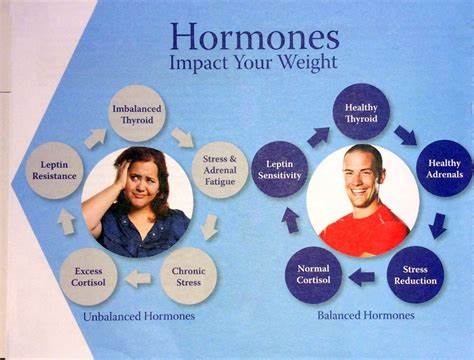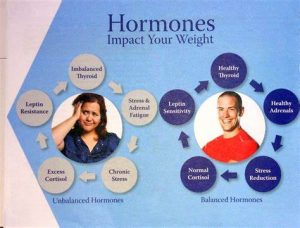The intricate dance of hormones plays a profound role in weight management. By understanding the crucial connection between hormonal balance and dietary choices, individuals can harness the power of nutrition to achieve their weight loss or weight gain goals. In this comprehensive exploration, we delve into how nutrition can empower individuals to optimize their hormonal health, paving the way for successful weight management.
Hormones and Their Role in Weight Management
- Insulin: Regulates blood sugar levels and influences fat storage. Managing insulin through diet can aid in weight loss and prevent weight gain.
- Leptin: Signals fullness to the brain. Leptin resistance can lead to overeating, while a diet rich in fiber, protein, and healthy fats can improve leptin sensitivity.
https://th.bing.com/th/id/OIP.YTvuSgsYTnPW2FXoX02DNQHaFo?pid=ImgDet&rs=1 - Ghrelin: Stimulates hunger. Balanced meals with sufficient protein and fiber can help control ghrelin levels, reducing the urge to overeat.
- Cortisol: The stress hormone linked to fat storage, especially in the abdominal area. Stress management and relaxation techniques can help maintain healthy cortisol levels.
Balancing Carbohydrates for Hormonal Health
- Complex Carbohydrates: Whole grains, fruits, and vegetables provide steady energy and prevent insulin spikes.
- Fiber: Fiber-rich foods slow the absorption of carbohydrates, helping maintain stable blood sugar levels.
- Sugar Control: Minimizing refined sugars and processed foods can prevent insulin fluctuations.
The Role of Protein in Hormonal Balance
- Leptin and Protein: Including lean protein in your meals can enhance leptin sensitivity, promoting feelings of fullness.
- Ghrelin Control: Protein helps control ghrelin, reducing hunger pangs and overeating.
Healthy Fats for Hormonal Health
- Hormone Production: Dietary fat is essential for the production of hormones. Healthy fats support hormonal balance.
- Omega-3 Fatty Acids: Found in fatty fish, flaxseeds, and walnuts, these fats have anti-inflammatory properties and may help manage stress hormones.
Micronutrients and Hormonal Health
- Vitamins and Minerals: Nutrients like vitamin D, magnesium, and zinc are essential for hormone production and sensitivity.
- Hydration: Proper hydration is vital for hormone regulation, as even mild dehydration can affect hormone levels.
Timing and Meal Frequency
- Regular Meals: Eating at consistent intervals can help regulate hormones and prevent overeating due to extreme hunger.
- Balanced Meals: A combination of carbohydrates, protein, and healthy fats in each meal supports hormonal balance and appetite control.
Stress Management and Hormonal Health
- Stress Reduction: Chronic stress can disrupt hormonal balance. Engaging in stress-reduction techniques such as mindfulness, meditation, and physical activity is crucial for weight management.
Image by freepic.diller on Freepik
Conclusion: Empowering Weight Goals Through Hormonal Harmony
Eating for hormonal balance is a powerful approach to weight management. By understanding the pivotal role of hormones in the body and aligning dietary choices to optimize their function, individuals can take control of their weight loss or weight gain goals. A harmonious relationship between nutrition and hormonal health can empower individuals to achieve their desired weight outcomes and maintain a healthier, more balanced lifestyle.












